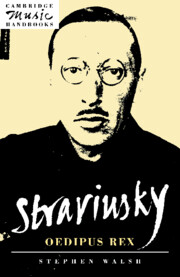Book contents
3 - In which the music unfolds
Published online by Cambridge University Press: 18 December 2009
Summary
Like most pigeon-holes in music history, the term ‘neo-classicism’ collects a lot of mail for quite different addressees. What looked at first like a bachelor flat turns out to be what T. S. Eliot's Prufrock would have called a one-night cheap hotel, where the clientéle is numerous, mobile, and often pseudonymous. The streets lead us to the overwhelming question that we cannot, unlike Prufrock, avoid asking: What is it?
For a start we can answer that it is, comprehensively, a misnomer. What the great aesthetic postmaster seems to mean by ‘neo-classicism’ is neither new (‘neo’) nor classical; or rather its classical elements are not new, and its new elements are not classical. There is new classicism all around us in music: in Berlioz, Mendelssohn, Tchaikovsky, Brahms – but also in Palestrina, Bach, Beethoven, Schoenberg and Panufnik. But it is not – or only rarely – ‘neo-classical’. These composers are, of course – by one of those delightfully Chestertonian confusions of the English language – classics, and their music is, by another such confusion, classical (in the sense that, for some reason, Irving Berlin's, Elvis Presley's and Miles Davis's is not). But its ‘classicism’, such as it is, has nothing to do with either attribute. It consists in an unconscious or semi-conscious desire on the part of the composer to ‘classicise’ his writing: to reject extravagance and obfuscation in favour of clarity, balance, restraint and a strict formal economy.
- Type
- Chapter
- Information
- Stravinsky: Oedipus Rex , pp. 23 - 66Publisher: Cambridge University PressPrint publication year: 1993

